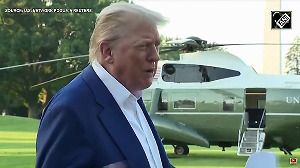For far too long, the BJP has postponed an uncomfortable debate on the need for radical change.
The outcome in Uttar Pradesh presents the perfect opportunity to force that debate, feels Shashi Shekhar.
There is no other way to put this but bluntly -- the BJP had a disastrous day on March 6, save for Manohar Parrikar's comeback in Goa and a creditable performance by its alliance partner, the Shiromani Akali Dal, in Punjab.
If the BJP's innate ability to score self-goals did it in Uttarakhand, its pathetic attempt at spinning the outcome in Uttar Pradesh says much about what the BJP is fast becoming -- a caricature of the Congress.
Let us be clear there are no consolation prizes in an electoral contest that results in a decisive verdict for one party.
The BJP entered the contest in Uttar Pradesh with significant structural weakness. A seat-by-seat analysis of how its fortunes have soured in successive election cycles in Uttar Pradesh tells it all.
The BJP's urban strongholds had seen a steady trend of declining turnouts clearly pointing to a committed but shrinking vote bank that perhaps was also ageing, while being overwhelmed by changing demographics.
Barring the Varun Gandhi exception in 2009, the Lok Sabha seats that the BJP managed to win in 2009 tell a story of further decline as it saw its stalwarts trail in many assembly segments. The BJP's committed yet shrinking vote base gave it a sold third place in many three way and four way contests, but nothing else to build on.
Given this structural weakness in the field, the BJP was perhaps prudent to focus its ground game on the micro-targeting of key demographic segments, while hoping to benefit from a communal polarisation in certain seats.
But then, which was the last campaign that was won solely by backroom campaigners bereft of an overarching theme or a mass phenomenon?
Even the BJP's incredible strike rate in Bihar, in terms of seats contested and seats won, was the result of the coming together of the two essential factors of a winning campaign -- a solid ground game boosted by a credible mass phenomenon, something it seriously lacked in this Uttar Pradesh election.
With due respect to Uma Bharti's persona and passion, she was hardly the messenger of change that Uttar Pradesh needed. Her belated entry into the electoral field did not help matters either from a pan-UP standpoint.
The BJP in Uttar Pradesh has been overladen with deadwood for a long time now, leaders from an era gone by, with little to show but their castes thanks to their last names. None of these leaders have demonstrated anything to capture popular imagination in the two decades since the Ram Janmabhoomi movement, yet the BJP has failed to effect a generational change in its moribund leadership.
No amount of spin can deflect focus from the fact that the BJP's allegedly bold moves in Uttar Pradesh were at best status quo-ist in their pursuit of incremental growth and, at worst, cynical in their attempt at welding together caste coalitions.
The reduced overall vote share of the BJP is testimony to the fact that these so-called bold moves did little to reverse the terminal decline the BJP finds itself in Uttar Pradesh.
Any discussion on radical change in the BJP invariably wades into the leadership question.
This lament is not about the leadership question, which as a BJP sympathiser I am confident will resolve itself in due course of time. It is about posing this fundamental question: How much further does the BJP need to shrink before it wakes up to the reality of a fundamental transformation?
The BJP has failed to break new ground in the eastern seaboard states. It has lost the ground it once held in Assam and Orissa. It is nowhere near a comeback in Andhra save for some goodwill in Telangana, which is yet to be proven in a competitive electoral contest. It is at best a super-regional party with a national outlook, as the electoral reality as it stands today.
To view the BJP's need for change narrowly through the 2014 lens is self-defeating and could even be fatal.
The logic of being able to attract allies cannot be the basis for reinventing the party to make it a fighting force. Acceptability in pre-poll alliances is premised on posing the least existential threat to a regional partner.
Taking that logic to its extreme end gets us into the same Delhi-based backroom engineering mess that started this process of terminal decline in its first place.
A Delhi-based backroom strategy that straddles the demands of anti-Congressism on the one hand and acceptability to regional allies on the other essentially reduces the BJP to a B-Team of the Congress, defocusing it from articulating a coherent agenda that puts it on the path to recovery.
From Mahasangram to Jan Chetana to the belated attempts at jumping on the Baba and Anna bandwagons, it is a long list of missed opportunities and wasted energy. Energy that should have been put on building the national mood, one city, town and village at a time, for a coherent aspirational agenda on what the BJP shall stand for in the rest of the decade.
Opportunities that should have been exploited to bring about a generational shift in leadership through a transparent grassroots process instead of an opaque backroom process.
Now is not the time to seek refuge in a feel good acceptability or to pursue a flawed strategy of anti-Congressism. For far too long, the BJP has postponed an uncomfortable debate on the need for radical change.
The outcome in Uttar Pradesh presents the perfect opportunity to force that debate.
If not in public, at least in private to begin with!
Shashi Shekhar is a social media commentator on Indian politics and public policy. His blog can be found at https://blog.offstumped.in






